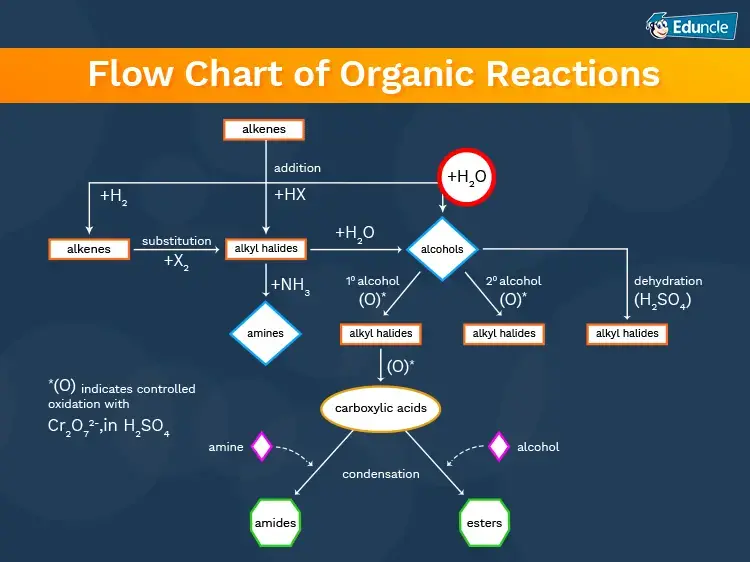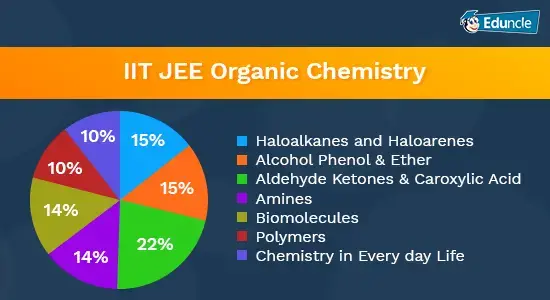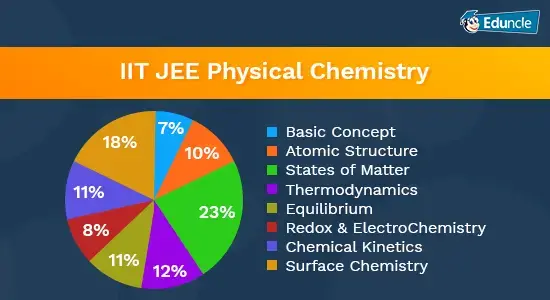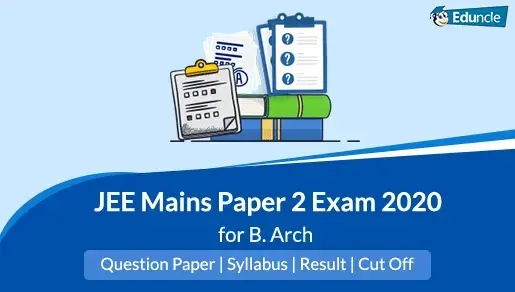Greetings!
Aspiring JEE is no less than an ambition that can turn your career into a beautiful one if you qualify it. You must be well-aware of this fact that no engineering or architecture student can qualify this exam if he/she is not prepared for the crucial subjects like – Physics, Chemistry & Maths.
IIT JEE Chemistry is a scoring subject if a student handles it carefully! This subject can boost up the selection chances if prepared well. The most favorite thing about Chemistry is that the questions asked in IIT JEE do not make students confound.
Working on the reaction mechanism and mastering the physical and chemical properties of elements and compounds is imperative. Most of the Questions are easier in IIT JEE Chemistry comparatively to other subjects.
In Chemistry 40% questions are easy, 50% are moderate level and 10 % questions are difficult.
IIT JEE Chemistry comprises three important parts-

To provide you a well-drafted plan for all these topics, we have explained them one by one in the blog below. Please go through this guide to have an ultimate learning experience for JEE 2020 Chemistry.
Topic 1: General Organic Chemistry IIT JEE
Organic chemistry plays a vital role in JEE Mains as well as JEE Advanced Exam. It has its own level of understanding! Nomenclature and Isomerism are the main key points that make a complete foot hold on this platform of Organic Chemistry.
Organic Chemistry IIT JEE deals with the scientific study of properties, structures, reactions and mechanism of organic compounds and materials. i.e. the carbon atoms consist in the Matter.
The study of IIT JEE Organic Chemistry includes both - physical and chemical properties of a compound. By using equivalent properties of both, you can master the behavior of organic matter in its pure form.
For example –
1. Petrochemicals are derived from crude oil or petroleum. Fractional distillation separates the raw material into organic compounds according to their different boiling points.
2. Polymers consist of long chains and branches of molecules. Common polymers you encounter every day are organic molecules. for example, Nylon, Polyethylene, PVC etc.
How to Crack Organic Chemistry IIT JEE? Important Topics & Methods to Study them!
If a student makes a way through the concepts of General Organic Chemistry, undoubtedly, he could handle every chemistry reaction and mechanism easily. Every year around 30% questions come from organic chemistry in JEE Exams.
Tip – Use the Flow Chart to Understand the Organic Chemistry Formulas for IIT JEE Reaction Mechanism.

Let’s get started to know how you can score well in IIT JEE Organic Chemistry!
1. Make Skills in Nomenclature
IUPAC Nomenclature is the first & foremost topic you will encounter, but it’s not easy to deal with this topic & move on. For naming the organic compounds you need a logical approach towards it. You must work on the fixed set of Rules to generate the Chemical compound nomenclature mechanism.
2. Learn to deal with Reaction Mechanism
Reaction Mechanism is determined in Chemical Kinematics to deal with reaction order and rate equation of reactants. Make command over reaction steps.
3. Carbon and its Compounds
The hybridization, structure, and shape of carbon compounds need to be noted. The Important concepts of Coal Gases and petroleum and special properties of carbon must be brushed up while you prepare for this subject.
4. Isomerism - The Essential One!
The structural and stereoisomerism are the important points to practice. You must know all the structures related to the compounds and their mechanism covers an important part in Isomerism.
5. Work on Naming Reactions
Naming Reaction is the heart of Organic Chemistry, if you like to deal with Reactions than you can master the Organic Chemistry. List down all the important Naming reactions like SN1 & SN2 reactions, Sand Mayer Reactions, Gattermann reactions, Cannizaro Reactions, Hoffman reactions, Wurtz Reactions etc.
6. Biomolecules, Polymers & Chemistry in Everyday Life
Simplest yet scoring these topics are!
Biomolecule covers an important part in organic chemistry. The RNA and DNA Structures along with special arrangements of glucose and carbohydrates, aldose & ketose groups, these are some of the important topics. The structure of Protein and carbohydrate is important for JEE point of view. Practice structures and reaction chains for this topic.
Get Free PDF of IIT JEE 2020 Syllabus Here
Organic Chemistry Topic Wise Weightage – Don’t Skip the Important Ones!
Here is the list of Important Topics for IIT JEE Chemistry (Organic). We advise you not to skip anyone of them if you really want to achieve success in the exam.

To know more about the Important Topics of JEE Chemistry for Mains & Advanced please visit following blogs –
JEE Mains 2020 Syllabus & List of Important Topics
JEE Advanced 2020 Syllabus & Important Topics List
Best Chemistry Book for IIT JEE Preparation 2020 | Picked by Best Authors of Organic Chemistry
Presenting you some of the best chemistry books for IIT JEE Preparation. Hope these will be helpful to you!
| S. No | Best Book for Organic Chemistry IIT JEE | Author |
| 1 | Organic Chemistry Books for IIT JEE | O. P. Tandon |
| 2 | Best Chemistry Book for IIT JEE | Morrison Boyd. |
| 3 | IIT JEE Chemistry Books - Concepts of Organic Chemistry | M.S. Chauhan |
| 4 | Best Book for Organic Chemistry for IIT JEE | J.D March |
| 5 | Organic Chemistry IIT JEE Book | Arihant Publications |
IIT JEE 2020 Topic 2: General Inorganic Chemistry
Inorganic chemistry for IIT JEE is one of the most important subordinates of chemistry in all aspects, facts, concepts, and its application that consists of the study of Atoms, Elements & their classifications. Inorganic Chemistry Deals with the Behavior & Synthesis of Inorganic & Organometallic Compounds.
Inorganic Chemistry covers a major Part in IIT JEE Exams but students give it less importance as compared to other parts of chemistry. This is because they found it difficult to cover its several properties and the usage of compounds.
Inorganic Chemistry is used in the medicines, fuels, coatings, pigments, as catalyst and many more.
For Example –
1. Chlorine is used in manufacturing of Polyvinyl Chloride such as - Pipes, Clothing, And Furniture etc. & Agriculture Chemicals such as - Fertilizers, Pesticides Insecticides and Soil Treatment). It is widely used in Water Treatment Plant and Sterilization Process.
2. Ammonia a nitrogen source of fertilizers and is one of the major product as an Inorganic compound used in paints, fibers, plastics, foams, explosives and many more.
Inorganic Chemistry Preparation Tips - Master IIT JEE with these Key Points!
Inorganic chemistry for IIT JEE is easier if block elements are taken at high priority.
1. Periodic Table is Essential
Make periodic table your biggest asset. The complete knowledge on the periodic table Metals, Nonmetals, Metalloids their position and the physical and chemical properties is essential. Learn it on fingerprints & master the entire Inorganic Chemistry for IIT JEE 2020 Exam.
2. Learn Chemical Reactions
A sure-shot formula to get hold on Chemical Reactions is to ‘learn to make it through a Word Equation’. This one is the unbeatable way to score well in inorganic chemistry!
Write each reaction with hand on paper and interrelate the chemicals and their usage.
3. Make Coordination with ‘Coordination Compounds’
The compounds and their isomerism need a basic understanding on topic. You must try to make practice of arranging the complexes in order of the properties. To enhance your skills, try to understand the electronic configuration of complexes.
4. The Transitive Elements – Key to Success
The S, P, D, F blocks play the crucial role in JEE Mains & JEE Advanced Exams. Go through the knowledge of shells and orbitals. Analyze the properties of the elements of each block & their free and combined state in nature.
Tip: All you need to do is learn the Physical and Chemical State, Density, Enthalpy, Melting Point, Boiling Points, Elements Reaction with Oxygen Air and Gases etc.
IIT JEE Inorganic Chemistry Topic Wise Weightage – Play Smart!
List down the Important Topics of IIT JEE Inorganic Chemistry & plan up a smart approach according to it.

Top 5 Books for JEE 2020 Preparation [Inorganic Chemistry]
Go through the list of Top IIT JEE Reference Books for Inorganic Chemistry & Score More Marks in the Exam!
| S. No | JEE Chemistry Books | Authors |
| 1 | Inorganic Chemistry | O.P Tandon |
| 2 | Inorganic Chemistry | J.D Lee |
| 3 | Inorganic Chemistry | Arihant Publications |
| 4 | Inorganic Chemistry for JEE Advanced | Cengage |
| 5 | Inorganic Chemistry | Cotton & Wilkinson |
To get the list of books as per the Mains & Advanced Exam, please visit here –
IIT JEE Mains 2020 Preparation Books
JEE Advanced 2020 Books & Authors
IIT JEE Chemistry 2020 Topic 3: Physical Chemistry
Performance in IIT JEE Physical Chemistry is naturally uplifted by the grasp on aptitude and IIT JEE Physics.
Physical Chemistry is the study of atomic, subatomic, macroscopic, and particulate phenomena in chemical systems in terms of the practices, concepts, and principles of physics.
The study of how matter behaves on a molecule and atomic level and how chemical reactions occur as important ones in Physical Chemistry. Merely, Chemists may develop new theories such as complex structures.
For example –
1. Electro-chemical Cell that converts the chemical energy into electrical energy.
2. The batteries we use in Everyday life is also an example of Physical Chemistry.
4 IIT JEE Physical Chemistry Chapters that You Must Not Skip!
Do you want to achieve top scores in JEE 2020 Chemistry? Follow these tips to ensure your preparations are well-going for the exam.
1. Don’t Forget to Study Mole Concepts
If you are good in formula application and calculation, you can do well in physical chemistry. Prepare a chart of Important formula and practice all the numerical related to it.
You must have a command on mole concepts as this chapter carries about 7 % weightage.
2. Master the Constants
Physical Chemistry comprises the numerical and concepts that have wide use of constants in them. Make a complete grasp on Physical, Chemical, and Molar gas constants and their applications as they are essential for numerical point of view.
3. Do Not Neglect the Electro-Chemistry
Students make a rush towards the tough chapters like Equilibrium and Electrochemistry to overfill their knowledge. In JEE Mains Question Paper, mostly questions are being framed out from Cell Reaction Mechanism, EMF, Half-Cell Reaction mechanism. Make a complete review on each concept!
Also check out – JEE Advanced Previous Years Question Papers.
4. Get inside the Atom
Understand the atomic structure, practice atomic models and their limitations. Studying the Principle of filling electronic orbitals for the points like - planks quantum theory, Heisen berg principle is meaningful. Around 2-3 Questions are being asked from this topic every year.
5. Redox Reaction
This topic involves the working on Oxidation-Reduction & Hydrolysis. You must know the balancing Redox Reactions. The Oxidizing and Reducing Agents play an important part in this type of reactions.
Please visit JEE Main Study Plan for better guidance!
Important JEE Topics under Physical Chemistry | Go through the Below Image
Based on their marking weightage, we have listed down all the Important Topics under Physical Chemistry of IIT JEE 2020 Exam. Check out which you would like to take at first!

Need more assistance? Please visit following blogs –
IIT JEE Mains Preparation Tips & Tricks
JEE Advanced 2020 Tips & Tricks by Experts
Physical Chemistry IIT JEE Books | Perfect List to Uplift Your Skills
Here comes the list of essential books to boost up your IIT JEE Exam Preparation. Is this what you’re looking for? Check it out in the below table!
| S. No | JEE Chemistry Books | Author |
| 1 | Numerical Chemistry | P.Bahadur |
| 2 | Physical Chemistry | P.Bahadur |
| 3 | General Chemistry | Ebbing |
| 4 | Numerical Chemistry | R.C. Mukherjee |
| 5 | Physical Chemistry | P.W.Atkins |
Revision Strategy for JEE Exams in Chemistry [Bonus Tip]
For providing you a wise approach to crack IIT JEE Chemistry, Eduncle Experts presents the list of topics that you must do at first & at last. Check Out!
| S. No | Must Do Topics | Do Topics | Last Do Topics |
| 1 | Chemical Bonding- | Atomic Structure | Chemistry in Everyday Life |
| 2 | Chemical Kinetics | Electro Chemistry | Environmental Chemistry |
| 3 | Chemical Thermodynamics | Polymers | General Process and process of Isolation of Metals |
| 4 | Coordination Chemistry | Classification of Elements and Periodicity in Properties | Hydro carbons |
| 5 | Equilibrium | Bio molecules | Organic Compounds containing Nitrogen |
| 6 | P block elements | Organic compounds containing Nitrogen | Purification of Organic Chemistry |
| 7 | S block elements | Redox Reactions | States of Matter |
| 8 | Organic compounds containing oxygen | Solid States | Surface Chemistry |
| 9 | Basic principles of Organic chemistry | Basic Concepts in chemistry | Physical Chemistry Principles |
| 10 | D & F block elements (Transitive Elements) | Solutions | Hydrogen |
Tip - If you want to succeed in JEE, then keep yourself updated with all the latest updates about the exam you're preparing for! Please go to the following blogs & mark the important dates & notification for yourself.
How was your learning experience for JEE Chemistry while reading this blog? Did it help you in anyway? Please do share out your precious feedback with us to help us in enhancing the reading experience for you.


















